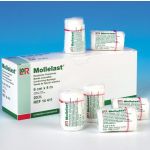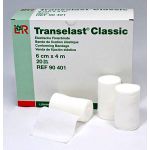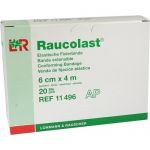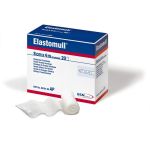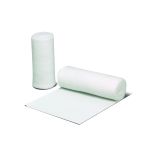Gauze Bandages
Gauze Bandage Rolls, Wraps, And Pads
The gauze bandages that we carry aren’t your drugstore gauze bandages! Our selection of compression gauze bandages have been chosen because they’re ideal for wrapping fingers, toes, and other body parts. The gauze bandages are often included as part of a multi-layer compression bandaging system that’s used to treat lymphedema, edema, and other medical conditions.
Shop our gauze bandages with pre-tax savings using your FSA or HSA account!
Gauze Bandage Rolls, Wraps, And Pads
Available in rolls, wraps, and pads, the compression gauze bandages have a loose-weave structure that makes them easy to apply, yet provides continuous support and pressure without constriction.
The compression gauze bandages are extremely soft, which makes them feel comfortable against the skin as they provide a gentle, uniform pressure.
Our Selection Of Compression Gauze Bandages
Our selection of compression gauze bandages includes:
- Elastomull gauze bandages
- Mollelast gauze bandages
- Raucolast gauze bandages
- Transelast Classic gauze bandages
- Conco gauze bandages
- non-sterile gauze bandages
Different Types Of Compression Gauze Bandages
We have gauze bandage rolls and gauze bandage wraps.
Gauze Bandage Rolls: Gauze rolls are great for securing foam pads and padding, as well as wound dressings. We have gauze bandage rolls in a variety of widths, including 1 inch, 2 inches, 3 inches, 4 inches, and 6 inches.
Gauze Bandage Wraps: Gauze wraps provide stable, effective fixation and immobilization during lymphedema therapy. The high degree of elasticity in the gauze wraps helps them remain secure, even on the most difficult areas of the body to treat.
Uses For The Compression Gauze Bandages
The compression gauze bandages have many uses, including:
- wrapping fingers
- wrapping toes
- edema reduction
- minor sprains and strains
- soft-tissue injuries
- securing wound dressings
For more information about our gauze bandages, please call (800) 770-1032, or e-mail info@bandagesplus.com.
••••••••••••••••••••••••••••••••••••FAQs About Gauze Bandages For Lymphedema
Gauze bandages play an important role in the management of lymphedema, providing compression that can help reduce swelling by promoting lymphatic drainage. Below are some of the most frequently asked questions about gauze bandages for lymphedema.
- What Are Gauze Bandages For Lymphedema
- What Are The Benefits Of Using Gauze Bandages
- What Are The Main Features Of Gauze Bandages
- short-stretch material (the gauze bandages have limited elasticity and provide firm and consistent support and compression)
- layering (the gauze bandages can be layered to achieve the optimum level of compression)
- non-slip (the gauze bandages are designed to stay in place)
- breathable and lightweight (the gauze bandages ensure that the skin can breathe, which can help prevent skin irritations and infections)
- How Are Gauze Bandages Applied
- How Often Should Gauze Bandages Be Changed
- How Do I Know If My Gauze Bandage Is Too Tight Or Too Loose
- Can I Reuse My Gauze Bandages
Definitely not your typical “drugstore” bandage, gauze bandages for lymphedema are specialized medical bandages that are designed to provide compression therapy.
Compression gauze bandages are often part of a multi-layer bandaging system that is used to treat and manage lymphedema, and they are typically applied in layers. Gauze bandages that are designed for lymphedema can help reduce swelling, prevent the re-accumulation of lymphatic fluid, improve mobility, and protect your skin.
The following features set these types of gauze bandages apart and help make them effective for the treatment of lymphedema:
Gauze bandages are typically applied by starting at the farthest extremity (e.g. the toes or fingers) and moving upwards. Each layer is overlapped by about 50% to help ensure even pressure. The highest pressure is applied at the extremities, with pressure gradually decreasing toward the body. This type of application helps promote lymphatic drainage.
Your healthcare provider should make specific recommendations. In general, however, gauze bandages for lymphedema are changed daily. Regular changes help the bandages maintain effective compression.
If your gauze bandage is too tight, you might feel pain, tingling, or numbness – or you might see a discoloration at your extremities (e.g. your toes or fingers). If your gauze bandage is too loose, it might slip or not provide sufficient compression (in which case you might not see a reduction in swelling).
Some gauze bandages are designed for single use, while others can be reused and washed. Check the manufacturer instructions. If you do wash your bandages, use a mild detergent and lukewarm water, then air dry them. Avoid fabric softeners and bleach, as they can degrade the material.
For more information about our gauze bandages for lymphedema, please call (800) 700-1032, or e-mail info@bandagesplus.com.
Please note that all of the information above is for general informational purposes. Please consult your healthcare provider for specific information and personalized recommendations for your situation.
••••••••••••••••••••••••••••••••••••Medicare Pays For Lymphedema Products
Please note: Thanks to the Lymphedema Treatment Act, which took effect on January 1, 2024, Medicare began to pay for lymphedema products for those who have Medicare B coverage and meet certain other coverage criteria. Please visit our website page covering the details of the Lymphedema Treatment Act to obtain more information about how Medicare pays for lymphedema garments, wraps, and bandages.


